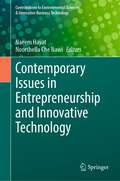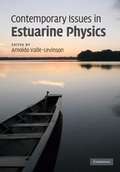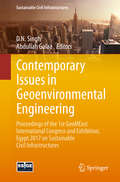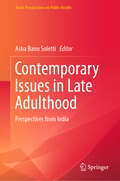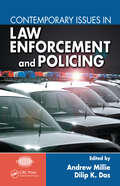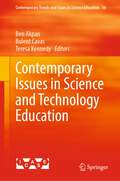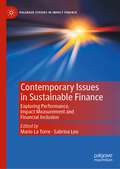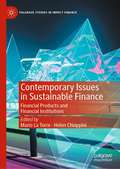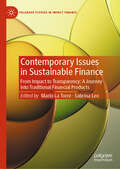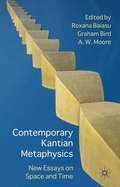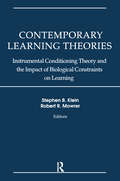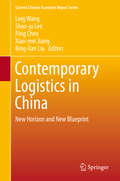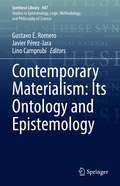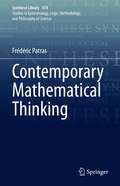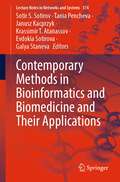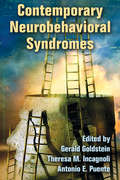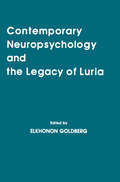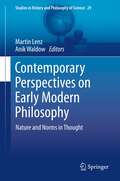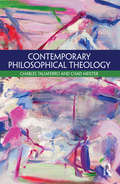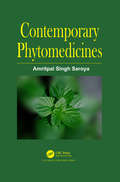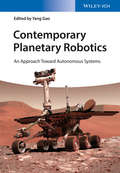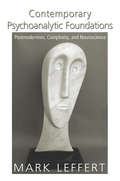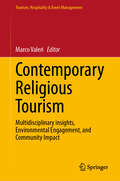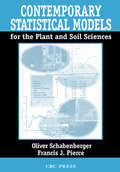- Table View
- List View
Contemporary Issues in Entrepreneurship and Innovative Technology (Contributions to Environmental Sciences & Innovative Business Technology)
by Naeem Hayat Noorshella Che NawiThe book offers state-of-the-art information in the field of entrepreneurship, business management, the role of technology to manage entrepreneurial firms, and innovation and social aspects of firms. The book also offers quality research with quantitative and qualitative designs offering insights into the emerging business trends among the entrepreneurial firms. The volume supports early career researchers and students looking for research acumen in small business and entrepreneurship.
Contemporary Issues in Estuarine Physics
by A. Valle-LevinsonEstuaries are of high socioeconomic importance with 22 of the 32 largest cities in the world located on river estuaries. Estuaries bring together fluxes of fresh and saline water, as well as fluvial and marine sediments, and contain high biological diversity. Increasingly sophisticated field observation technology and numerical modeling have produced significant advances in our understanding of the physical properties of estuaries over the last decade. This book introduces a classification for estuaries before presenting the basic physics and hydrodynamics of estuarine circulation and the various factors that modify it in time and space. It then covers special topics at the forefront of research such as turbulence, fronts in estuaries and continental shelves, low inflow estuaries, and implications of estuarine transport for water quality. Written by leading authorities on estuarine and lagoon hydrodynamics, this volume provides a concise foundation for academic researchers, advanced students and coastal resource managers.
Contemporary Issues in Geoenvironmental Engineering: Proceedings of the 1st GeoMEast International Congress and Exhibition, Egypt 2017 on Sustainable Civil Infrastructures (Sustainable Civil Infrastructures)
by D N Singh Abdullah GalaaWith high urbanization rates, advancement in technologies, and changes in consumption behavior of people, wastes generated through the daily activities of individuals and organizations pose many challenges in their management. The articles presented in this edited volume deal with the attempts made by the scientists and practitioners to address contemporary issues in geoenvironmental engineering such as characterization of dredged sediments, geomaterials & waste, valorization of waste, sustainability in waste management and some other geoenvironmental issues that are becoming quite relevant in today's world. This volume is part of the proceedings of the 1st GeoMEast International Congress and Exhibition on Sustainable Civil Infrastructures, Egypt 2017.
Contemporary Issues in Late Adulthood: Perspectives from India (Asian Perspectives on Public Health)
by Asha Banu SolettiThis book provides an in-depth exploration of the challenges and diversity inherent in the ageing process in India. It offers valuable insights into various aspects of growing old, covering a spectrum of issues influenced by socioeconomic inequalities and diversities that shape the lives of older adults. Despite existing research on aging, there's often a tendency to overlook the diverse experiences within the older population, a gap this book aims to bridge. The chapters of the book, are written by practitioners and academicians, sharing their insights on the issue. The book adopts a multidisciplinary approach, drawing on contributions from a diverse array of experts to comprehensively address the myriad issues affecting late adulthood. From mental health and nutrition to gender dynamics, income security, elder abuse, and intergenerational concerns, each topic is explored. A central theme of the book is the importance of recognizing and addressing the unique challenges faced by different groups within the elderly population. . By synthesizing insights from different fields, the book offers a comprehensive examination of the challenges encountered by older adults across multiple dimensions of their lives. This interdisciplinary perspective enriches the discourse on ageing and provides practical insights for researchers, practitioners, policymakers, and anyone interested in advocating for the well-being of ageing populations.
Contemporary Issues in Law Enforcement and Policing (International Police Executive Symposium Co-Publications)
by Dilip K. Das Andrew MillieRising terrorism and advances in technology, along with new organizational strategies and investigative techniques, have stretched the traditional role of the police officer. Calls for strong, intelligence-driven, paramilitary policing juxtaposed with a demand for ‘softer community policing, leave officers under increased pressure to be tough and
Contemporary Issues in Science and Technology Education (Contemporary Trends and Issues in Science Education #56)
by Teresa Kennedy Ben Akpan Bulent CavasThis edited volume discusses major issues in present-day science and technology education (STE). It is divided into three thematic sections: philosophical foundations and curriculum development; sustainable development, technology and society; and the learning sciences and 21st century skills. Section I examines the history and future of STE curriculum development, along with specific issues within this dynamic area. Section II explores sustainable development in three important aspects: economic development, social development, and environmental protection. Section III covers the 21st century skills that are of overarching importance to the success of learners in school and the world of work. Anchoring each chapter is an assemblage of veteran science and technology education specialists selected from across the world. The book’s target is a worldwide audience of undergraduate / post-graduate students and their teachers, as well as researchers. This book’s exploration of the ever-increasing advances in STE and its narrative writing style will be of interest to a broad range of readers.
Contemporary Issues in Sustainable Finance: Exploring Performance, Impact Measurement and Financial Inclusion (Palgrave Studies in Impact Finance)
by Mario La Torre Sabrina LeoThe notion of sustainable development is applied to financial activities through sustainable finance. As a result, sustainable finance attempts to produce long-term value by allocating capital to projects that, in addition to providing economic benefits, are furthermore beneficial to society and do not burden the environment.This book sheds light on contemporary challenges in sustainable finance, addressing two key perspectives: measurement and performance, and products and business models. In particular, the volume examines theoretically and empirically the relations between business models and non-financial impact, both environmental and social; as for the social goals, a special focus of the book is dedicated to the gender gap.
Contemporary Issues in Sustainable Finance: Financial Products and Financial Institutions (Palgrave Studies in Impact Finance)
by Mario La Torre Helen ChiappiniThis book sheds light on current issues in sustainable finance through an in-depth analysis and discussion of relevant sustainable products and sustainable initiatives of several financial institutions. This edited collection critically presents and discusses several relevant theoretical issues, case studies of innovative financial products and sustainable institutions, as well as empirically investigates issues related to both financial and social performance. The book focuses on several innovative products across the sustainable finance ecosystem, including social impact bonds, crowdfunding and green bonds. Similarly, the book spotlights the sustainable investment strategies of institutions ranging from family foundations to asset managers.
Contemporary Issues in Sustainable Finance: From Impact to Transparency: a journey into traditional financial products (Palgrave Studies in Impact Finance)
by Mario La Torre Sabrina LeoThis book explores the evolving landscape of sustainable finance across various sectors and delves into critical topics ranging from the integration of Environmental, Social, and Governance (ESG) criteria in investment decisions to the transformative potential of blockchain technology. In more detail, three main perspectives are addressed: the issue of materiality and integrating ESG factors in the firm business model; the trends in the debt and credit markets; and the role of governance and transparency. In nine chapters, the book covers both a theoretical approach as well as empirical analysis, providing essential perspectives for regulators, investors, practitioners, and scholars navigating the complex landscape of sustainable finance.
Contemporary Kantian Metaphysics
by A. W. Moore Graham Bird Roxana BaiasuThis collectionresponds to two needs in the literature. First, the Kantian tradition of thought about space and time represents a rich philosophical resource, insufficiently explored in Anglo-American philosophy. The volume explores this resource. More precisely, it questions a basic assumption of a powerful trend in contemporary metaphysics: the assumption that reality is spatio-temporally organised independently of us. Kant's revolutionary contribution to metaphysics was likewise to question this assumption. The volume draws attention to Kant's distinctive approach to metaphysics and breaks new ground by radically broadening the scope of recent discussions on space and time, in particular by examining certain connections which metaphysics and science have to epistemic agency. Second, contemporary Kantian philosophy is currently pursued along two lines of thinking developed in Anglo-American literature and European philosophy. This work brings their distinct claims into a productive dialogue on topical issues such as action, perception, the body, and cognition and its limits.
Contemporary Learning Theories: Volume II: Instrumental Conditioning Theory and the Impact of Biological Constraints on Learning
by Stephen B. Klein Robert R. MowrerThis unique two-volume set provides detailed coverage of contemporary learning theory. Uniting leading experts in modern behavioral theory, these texts give students a complete view of the field. Volume I details the complexities of Pavlovian conditioning and describes the current status of traditional learning theories. Volume II discusses several important facets of instrumental conditioning and presents comprehensive coverage of the role of inheritance on learning. A strong and complete base of knowledge concerning learning theories, these volumes are ideal reference sources for advanced students and professionals in experimental psychology, learning and learning theory, and comparative physiology.
Contemporary Logistics in China: New Horizon and New Blueprint (Current Chinese Economic Report Series)
by Bing-Lian Liu Ling Wang Shao-Ju Lee Ping Chen Xiao-Mei JiangThis book is the sixth volume in a series entitled "Contemporary Logistics in China," authored by researchers at the Logistics Center, Nankai University. In the spirit of the five preceding volumes, published annually in previous years, this book carries on the ideal of providing a systematic exposition on the development of logistics in China to the English-speaking community. Specifically, this volume captures China's logistics development at a crucial turning point. On the one hand, it echoes the new horizon advocated by the Government's One-Belt-One-Road Initiative for global cooperation; on the other, it resonates with the new blueprint of implementing the main contents of the 13th Five-year Plan on logistics development. Subjects covered include the macro-factors pertaining to logistics development, region-specific plans, industry-wide transformation, globally oriented moves, and current hot topics. Expositions and analyses on these subjects are based on the latest available sources and statistical data. As with the previous volumes, the ultimate aim of this book is to present a timely portrait of the rapid growth of China's logistics market and the status of its logistics industry's evolution. In so doing, this book offers an in-depth analysis of the critical issues and dilemmas amid the ongoing, dynamic and multi-faceted development, and presents a valuable reference source for interested readers in the academic and professional fields.
Contemporary Materialism: Its Ontology and Epistemology (Synthese Library #447)
by Lino Camprubí Gustavo E. Romero Javier Pérez-JaraThis book provides an up-to-date revision of materialism’s central tenets, its main varieties, and the place of materialistic philosophy vis a vis scientific knowledge.Materialism has been the subject of extensive and rich controversies since Robert Boyle introduced the term for the first time in the 17th century. But what is materialism and what can it offer today? The term is usually defined as the worldview according to which everything real is material. Nevertheless, there is no philosophical consensus about whether the meaning of matter can be enlarged beyond the physical. As a consequence, materialism is often defined in stark exclusive and reductionist terms: whatever exists is either physical or ontologically reducible to it. This conception, if consistent, mutilates reality, excluding the ontological significance of political, economic, sociocultural, anthropological and psychological realities. Starting from a new history of materialism, the present book focuses on the central ontological and epistemological debates aroused by today’s leading materialist approaches, including some little known to an anglophone readership. The key concepts of matter, system, emergence, space and time, life, mind, and software are checked over and updated. Controversial issues such as the nature of mathematics and the place of reductionism are also discussed from different materialist approaches. As a result, materialism emerges as a powerful, indispensable scientifically-supported worldview with a surprising wealth of nuances and possibilities.
Contemporary Mathematical Thinking (Synthese Library #474)
by Frédéric PatrasThis book deals with the evolution of mathematical thought during the 20th century. Representing a unique point of view combining mathematics, philosophy and history on this issue, it presents an original analysis of key authors, for example Bourbaki, Grothendieck and Husserl. As a product of 19th and early 20th century science, a canon of knowledge or a scientific ideology, mathematical structuralism had to give way. The succession is difficult, still in progress, and uncertain. To understand contemporary mathematics, its progressive liberation from the slogans of "modern mathematics" and the paths that remain open today, it is first necessary to deconstruct the history of this long dominant current. Another conception of mathematical thought emerged in the work of mathematicians such as Hilbert or Weyl, which went beyond the narrow epistemological paths of science in the making. In this tradition, mathematical thought was accompanied by a philosophical requirement. Modernity teaches us to revive it. The book is intended for a varied public: mathematicians concerned with understanding their discipline, philosophers of science, and the erudite public curious about the progress of mathematics.
Contemporary Methods in Bioinformatics and Biomedicine and Their Applications (Lecture Notes in Networks and Systems #374)
by Krassimir T. Atanassov Janusz Kacprzyk Evdokia Sotirova Sotir S. Sotirov Tania Pencheva Galya StanevaThis book gathers selected papers from the First International Symposium on Bioinformatics and Biomedicine. Issues related to medicine and health care constitute one of the grand challenges faces by the mankind, and this naturally implies a growing interest in these problems among both researchers and scholars, politicians and policymakers, as well as economist. The present values which gather selected papers from the First International Symposium on Bioinformatics and Biomedicine (BioInfoMed’2020) is a recent response to this interests. In the subsequent sections and chapters, it covers a multitude of various topics related to bioinformatics, biomedicine, bioenginering, as well as a broadly perceives healthcare. Issues related to decision making in bioinformatics, biomedicine and health care, mathematical modelling in biomedicine and health care, artificial intelligence in biomedicine and health care, uncertainty and imprecision, notably intuitionistic fuzzy sets with applications in bioinformatics and biomedicine, biomedical approaches and applications, biomedical imaging and image processing, and excitable structures and motor activity are covered.
Contemporary Neurobehavioral Syndromes
by Gerald Goldstein Theresa M. Incagnoli Antonio E. PuenteDuring the twentieth century, new neurobehavioral diseases appeared or were described for the first time. Exposure to certain toxins or noxious environments, for example, produced illnesses that did not exist before the twentieth century. In addition, established illnesses were reconceptualized with regard to their cause or neurobiological basis. Autism, for instance, was described for the first time during the twentieth century and may not have existed previously. Its cause was subsequently reconceptualized from a disorder related to inadequate parenting, to a brain disorder with possible genetic causes. These major new and reconceptualized disorders are reviewed in this book with regard to their neurocognitive characteristics, causes, and outcome. Disorders covered include ADHD in adults, Lewy Body Dementia, autism, multiple chemical sensitivity, deployment syndromes found in veterans of the Persian Gulf and Afghanistan wars, effects of low birth weight, neurobehavioral respiratory disorders, PTSD, and comorbid disorders such as depression and brain injury. The expert reviews of these disorders give balanced coverage of the ongoing and often controversial research findings that continue to generate much professional and public interest. This volume provides an essential resource for researchers, instructors, and clinicians in the fields of neuropsychology, psychiatry, behavioral neurology, neuroscience, toxicology, as well as the informed general public concerned and affected by these disorders.
Contemporary Neuropsychology and the Legacy of Luria (Institute for Research in Behavioral Neuroscience Series)
by Elkhonon GoldbergBest known as a founding father of neuropsychology, Luria is remembered for his clinical approach, which in many ways foreshadowed and served as the basis for the currently popular "process approach" to neuropsychological diagnosis. Although he never completed the job of designing a general theory of brain- behavioral relations, he nonetheless contributed mightily to the ongoing effort to develop one, and to the emergence of neuropsychology as a mature science. Written by professionals who either knew Alexandr Romanovich Luria personally or experienced his scientific influence, the topics examined in this volume reflect the expanse of his interests and contributions.
Contemporary Nutrition 9th Edition
by Gordon M. Wardlaw Anne M. Smith Angela Collene"Contemporary Nutrition" is a complete and balanced resource for nutrition information written at a level non-science majors can understand. Completely revised and up-to-date with MyPlate, Healthy People 2020 and Dietary Guidelines for Americans, 2010, it provides the ideal balance of reliable nutrition information and practical consumer-oriented knowledge. With a friendly writing style, the authors act as the student's personal guide to dispelling common misconceptions and to gaining a solid foundation for making informed nutrition choices. "Contemporary Nutrition" emphasizes that a population consists of individuals with varying genetic and cultural backgrounds, and these individuals will have varying responses to diet. The knowledge gained from this text will allow students to personalize nutrition information and empower them to make better choices in their daily lives.
Contemporary Perspectives on Early Modern Philosophy: Nature and Norms in Thought (Studies in History and Philosophy of Science #29)
by Martin Lenz Anik WaldowNormativity has long been conceived as more properly pertaining to the domain of thought than to the domain of nature. This conception goes back to Kant and still figures prominently in contemporary epistemology, philosophy of mind and ethics. By offering a collection of new essays by leading scholars in early modern philosophy and specialists in contemporary philosophy, this volume goes beyond the point where nature and normativity came apart, and challenges the well-established opposition between these all too neatly separated realms. It examines how the mind's embeddedness in nature can be conceived as a starting point for uncovering the links between naturally and conventionally determined standards governing an agent's epistemic and moral engagement with the world. The original essays are grouped in two parts. The first part focuses on specific aspects of theories of perception, thought formation and judgment. It gestures towards an account of normativity that regards linguistic conventions and natural constraints as jointly setting the scene for the mind's ability to conceptualise its experiences. The second part of the book asks what the norms of desirable epistemic and moral practices are. Key to this approach is an examination of human beings as parts of nature, who act as natural causes and are determined by their sensibilities and sentiments. Each part concludes with a chapter that integrates features of the historical debate into the contemporary context.
Contemporary Philosophical Theology
by Charles Taliaferro Chad MeisterIn Contemporary Philosophical Theology, Charles Taliaferro and Chad Meister focus on key topics in contemporary philosophical theology within Christianity, Islam, and Judaism, as well as Hinduism and Buddhism. The volume begins with a discussion of key methodological tools available to the philosophical theologian, such as faith and reason, science and religion, revelation and sacred scripture, and authority and tradition. The authors use these tools to explore subjects including language, ineffability, miracles, evil, and the afterlife. They also grapple with applied philosophical theology, including environmental concerns, interreligious dialogue, and the nature and significance of political values. A concluding discussion proposes that philosophical theology can contribute to important reflections and action concerning climate change.
Contemporary Phytomedicines
by Amritpal Singh SaroyaThe term phytomedicine was coined by French physician Henri Leclerc in 1913. Till recently phytomedicine has remained in the background. But due to emerging challenges to the conventional pharmaceutical industry (cost effectiveness and potency of the drugs), phytomedicine has made a dramatic comeback. Phytomedicine has witnessed several changes and several new concepts have been introduced. Phytomedicine, although, a separate discipline, is strongly linked to Phytotherapy and Phytopharmacology. As the title suggests the book is an attempt to bridge the gap between fundamental and emerging concepts in this field of medicine. The book has been divided into two parts. Part A deals with core issues of the phyto-pharmaceutical drug industry. The book begins with an introductory chapter dealing with basic definitions with phytomedicine. Chapters 2-5 narrate emerging subjects such as Phytopharmacovigilance, Phytopharmacoeconomics, Phytopharmacoepidemiology and Phytopharmacogenomics. Chapter 6 discusses ethical issues in phytomedicine. Chapter 7 covers recent advances in drug delivery systems in phytomedicine whereas Chapter 8 is about application of nanotechnology in the field of phytomedicine. The further chapters cover metabolomics, regulatory and legal aspects of the phyto-pharmaceutical drug industry. The chapter on herbal bioavailability enhancing agents is the salient feature of Part-A. Part B is related to applied research in the field of phytomedicine. Experimental findings on phyto-bioactive agents such as withanolides, steroidal alkaloids, phytosteroids and phytocannabinoids have been elaborated. Nine annexures related to herbal drug registration are included.
Contemporary Planetary Robotics: An Approach Toward Autonomous Systems
by Yang GaoFilling the gap for readers from both academia and industry wishing to pursue their studies and/or careers in this emerging field, this is a one-stop tour of the history, evolution, key systems, and technologies of planetary robotics. The book provides a comprehensive introduction to the R&D aspects, ranging from robotic vision, surface rover locomotion, navigation, and remote/semi/autonomous operation, to sample acquisition/preparation, and subsurface mobility. It equally offers a systematic overview of major planetary robotic systems, covering the rovers, manipulators, samplers and drillers. It also includes a chronicle to explain the evolution of robotics within planetary missions since the Surveyor 3 mission in the 1960s. The definitive reference on autonomous robotics and an important contribution to current and future programs run by such space agencies as ESA and NASA.
Contemporary Psychoanalytic Foundations: Postmodernism, Complexity, and Neuroscience
by Mark LeffertPast scholars have tried to classify psychoanalysis as an intrinsically positivist science, with varying degrees of success. Their critics have fared little better with narrow applications of postmodern thought, which focus on smaller areas within psychoanalysis and, as a result, neglect the evolution of the discipline as a whole. In an effort to provide a ground for current psychoanalytic thought, Mark Leffert creates an interreferential schema which balances the influences of postmodernism, complexity theory, and neuroscience as its key factors. Using the heterogeneity of postmodern thought as a starting point, he traces its impact on and implications for the development of the discipline, leading into the realm of complexity theory – which is relatively new to the psychoanalytic literature – and how it informs as well as constrains certain psychoanalytic assumptions. The book then turns to neuroscience, the "hard" scientific study of the complexities of the brain, and how recent research informs psychoanalytic theory and may shed light on aspects of memory, the conscious, and the unconscious. Taken together, these three elements create a firm basis for the current trends in psychoanalysis and the direction of its development in the years to come.
Contemporary Religious Tourism: Multidisciplinary insights, Environmental Engagement, and Community Impact (Tourism, Hospitality & Event Management)
by Marco ValeriThis book explores the multifaceted impact of religious tourism on prominent global destinations, addressing significant research gaps in this evolving field. Religious tourism, driven by complex psychosocial motives, particularly religious and spiritual needs, has long influenced travel behavior. Pilgrimages, a key aspect of religious tourism, are examined in depth, highlighting their role in fulfilling spiritual and material needs across various belief systems. The book investigates the intricate relationship between religion and tourism, considering factors such as authenticity, emotional solidarity, pro-environmental behaviors, and the educational aspects of spiritual journeys. With case studies from diverse regions such as Greece, India, Italy, and Bulgaria, the book offers a global perspective on how religious tourism intersects with marketing, economics, social development, and sustainability. This volume provides valuable insights for academics, practitioners, and policymakers interested in the profound and diverse implications of religious tourism in different cultural and geographical contexts.
Contemporary Statistical Models for the Plant and Soil Sciences
by Francis J. Pierce Oliver SchabenbergerDespite its many origins in agronomic problems, statistics today is often unrecognizable in this context. Numerous recent methodological approaches and advances originated in other subject-matter areas and agronomists frequently find it difficult to see their immediate relation to questions that their disciplines raise. On the other hand, statisticians often fail to recognize the riches of challenging data analytical problems contemporary plant and soil science provides.The first book to integrate modern statistics with crop, plant and soil science, Contemporary Statistical Models for the Plant and Soil Sciences bridges this gap. The breadth and depth of topics covered is unusual. Each of the main chapters could be a textbook in its own right on a particular class of data structures or models. The cogent presentation in one text allows research workers to apply modern statistical methods that otherwise are scattered across several specialized texts. The combination of theory and application orientation conveys ìwhyî a particular method works and ìhowî it is put in to practice.About the downloadable resourcesThe accompanying downloadable resources are a key component of the book. For each of the main chapters additional sections of text are available that cover mathematical derivations, special topics, and supplementary applications. It supplies the data sets and SAS code for all applications and examples in the text, macros that the author developed, and SAS tutorials ranging from basic data manipulation to advanced programming techniques and publication quality graphics.Contemporary statistical models can not be appreciated to their full potential without a good understanding of theory. They also can not be applied to their full potential without the aid of statistical software. Contemporary Statistical Models for the Plant and Soil Science provides the essential mix of theory and applications of statistical methods pertinent to research in life sciences.
